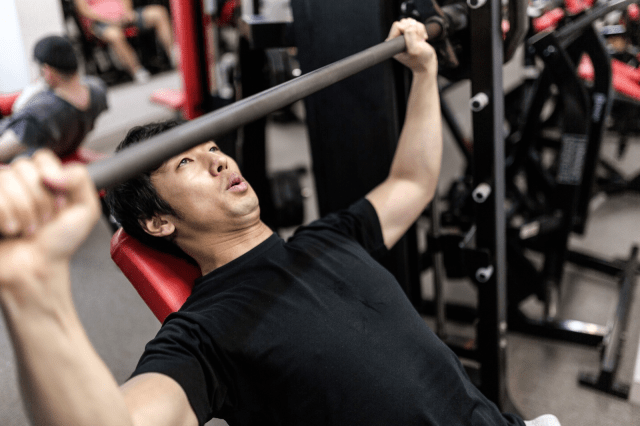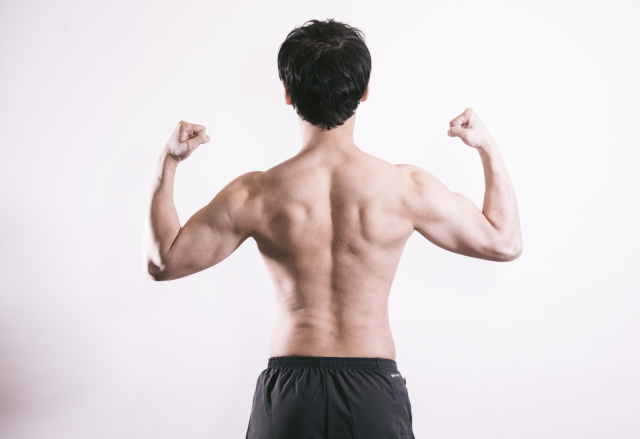
Lead researcher says pumping iron gives salarymen a joy “that they can’t get from work.”
The stereotypical life of a middle-aged salaryman is supposed to go something like this: Wake up and go to work. After work, go drinking with your boss and coworkers at an izakaya pub, then go for a second session of drinks at some hole-in-the-wall bar, grab a bowl of late-night ramen somewhere, head home, go to sleep, and do it all again the next day.
Dai-Ichi Life Insurance’s Economics Research Institute, though, says there’s another activity that’s becoming increasingly common on salarymen’s schedules: weightlifting. According to a report authored by the institute’s chief economist, Toshihiro Nagahama, a growing number of Japanese businessmen in their late 30s, 40s, and 50s are following up a day of pushing paper and clacking keyboards by pumping iron.
Nagahama himself is a midlife convert to weightlifting, following a scathing physical roughly five years back which showed him to have hyperlipidaemia (excessive fat in the blood), something he’s largely alleviated through improved fitness and diet. As to what’s triggering the trend, Nagahama says that weightlifting, or “kintore” as it’s called in Japanese (from kinniku toreningu/”muscle training”), is a good fit for mature white-collar workers in Japan. Recent workplace reforms have led to less overtime in conscientiously managed companies, giving salarymen more time to use for other activities, such as taking care of their health.
However, Japan’s baseline work culture being what it is, it’s not like these weightlifting salarymen are clocking out of the office at 3 in the afternoon. They still have busy lives, and Nagahama explains that weightlifting is a more time-effective way of getting/staying in shape than other exercises like jogging.
“For jogging, you have to run every day [to see results],” Nagahama says. “But with weightlifting, you need to give the muscles you use time to heal, so it’s actually counterproductive to lift every day. Even if you only lift once or twice a week, if you couple that with a moderately healthy diet, you’ll easily notice positive results.”
Nagahama stresses the visible rewards of weightlifting as a major motivator: “If you do a proper one-hour workout once or twice a week, and keep at it diligently, your muscles will become visibly bigger, and your physique will noticeably change.” The economist also asserts that unlike high-impact activities, like jogging, or sports that require other participants, like tennis, weight-lifting is something that’s easier to start in middle age, and that the metabolism-boosting effects of bigger muscles is another attractive point for salarymen, since it helps to mitigate the effects of those mugs of beer and bowls of ramen even on days they’re not actively exercising.
Finally, Nagahama thinks there’s also a psychological factor at play. Many Japanese companies promote employees based on experience and seniority, but the higher you get in the corporate pyramid, the fewer spots there are above for you to rise into. Once they hit their mid 40s, some salarymen start to be able to see the endpoint of their career trajectory, and for someone whose primary reward-for-effort in his adult life has been moving one more rung up the ladder, that slowing of momentum can leave them feeling a little empty.
Weightlifting, though, with its easily trackable performance statistics (weight lifted, number of reps in a set, number of sets in a workout), plus the visible body changes mentioned above, gives these salarymen something to strive for. “One of the great joys of weightlifting is how it gives you a sense of personal development that you can’t get from work,” Nagahama says.
An additional bump in attention for weightlifting came with the fall TV season’s anime adaptation of fitness manga How Heavy Are the Dumbbells You Lift?, though that’s something that’s been occurring primarily among younger demographics than Nagahama’s report is focused on. Still, the combined effects have been enough to make “Kinniku ha uragiranai,” “Muscles won’t betray you,” a new rallying cry for amateur weightlifters in Japan. Nagahama even references the saying in his report, and it sounds like the weight rooms at Japanese gyms are going to be at least a little more crowded than they used to be.
Source: J-Cast Kaisha Watch via Livedoor News via Hachima Kiko
Top image: Pakutaso
Insert images: Pakutaso (1, 2)
● Want to hear about SoraNews24’s latest articles as soon as they’re published? Follow us on Facebook and Twitter!
Follow Casey on Twitter, where he misses being able to lift weights outdoors in Los Angeles.



 Weightlifting anime’s theme song video blows past 115 million views with help from muscle idol
Weightlifting anime’s theme song video blows past 115 million views with help from muscle idol We set off a 45-yen (US$0.41) weightlifting firework from the ’70s in honor of the Tokyo Olympics
We set off a 45-yen (US$0.41) weightlifting firework from the ’70s in honor of the Tokyo Olympics Japan’s muscle idol continues to turn heads with body that looks like it could crush stone 【Pics】
Japan’s muscle idol continues to turn heads with body that looks like it could crush stone 【Pics】 “Common habits of Japan’s low earners”: What this survey tells us, and what it doesn’t
“Common habits of Japan’s low earners”: What this survey tells us, and what it doesn’t Foreigner’s request for help in Tokyo makes us sad for the state of society
Foreigner’s request for help in Tokyo makes us sad for the state of society Japanese city loses residents’ personal data, which was on paper being transported on a windy day
Japanese city loses residents’ personal data, which was on paper being transported on a windy day Historical figures get manga makeovers from artists of Spy x Family, My Hero Academia and more
Historical figures get manga makeovers from artists of Spy x Family, My Hero Academia and more Osaka governor suggests lowering voting age to 0 to curb population decline
Osaka governor suggests lowering voting age to 0 to curb population decline Suntory x Super Mario collaboration creates a clever way to transform into Mario【Videos】
Suntory x Super Mario collaboration creates a clever way to transform into Mario【Videos】 Smash Bros. director Sakurai stabs Kirby in the face, has delicious justification for it
Smash Bros. director Sakurai stabs Kirby in the face, has delicious justification for it Japan’s massive matcha parfait weighs 6 kilos, contains hidden surprises for anyone who eats it
Japan’s massive matcha parfait weighs 6 kilos, contains hidden surprises for anyone who eats it Ghibli Park now selling “Grilled Frogs” from food cart in Valley of Witches
Ghibli Park now selling “Grilled Frogs” from food cart in Valley of Witches Starbucks Japan releases new mugs and gifts for Mother’s Day
Starbucks Japan releases new mugs and gifts for Mother’s Day Sakura season arrives at McDonald’s Japan with new range of exclusive menu items
Sakura season arrives at McDonald’s Japan with new range of exclusive menu items McDonald’s new Happy Meals offer up cute and practical Sanrio lifestyle goods
McDonald’s new Happy Meals offer up cute and practical Sanrio lifestyle goods Japanese ramen restaurants under pressure from new yen banknotes
Japanese ramen restaurants under pressure from new yen banknotes French Fries Bread in Tokyo’s Shibuya becomes a hit on social media
French Fries Bread in Tokyo’s Shibuya becomes a hit on social media Studio Ghibli releases new action figures featuring Nausicaä of the Valley of the Wind characters
Studio Ghibli releases new action figures featuring Nausicaä of the Valley of the Wind characters New private rooms on Tokaido Shinkansen change the way we travel from Tokyo to Kyoto
New private rooms on Tokaido Shinkansen change the way we travel from Tokyo to Kyoto Red light district sushi restaurant in Tokyo shows us just how wrong we were about it
Red light district sushi restaurant in Tokyo shows us just how wrong we were about it Tokyo Tsukiji fish market site to be redeveloped with 50,000-seat stadium, hotel, shopping center
Tokyo Tsukiji fish market site to be redeveloped with 50,000-seat stadium, hotel, shopping center All-you-can-drink Starbucks and amazing views part of Tokyo’s new 170 meter-high sky lounge
All-you-can-drink Starbucks and amazing views part of Tokyo’s new 170 meter-high sky lounge Beautiful Ghibli sealing wax kits let you create accessories and elegant letter decorations【Pics】
Beautiful Ghibli sealing wax kits let you create accessories and elegant letter decorations【Pics】 Studio Ghibli releases Kiki’s Delivery Service chocolate cake pouches in Japan
Studio Ghibli releases Kiki’s Delivery Service chocolate cake pouches in Japan New definition of “Japanese whiskey” goes into effect to prevent fakes from fooling overseas buyers
New definition of “Japanese whiskey” goes into effect to prevent fakes from fooling overseas buyers Our Japanese reporter visits Costco in the U.S., finds super American and very Japanese things
Our Japanese reporter visits Costco in the U.S., finds super American and very Japanese things Studio Ghibli unveils Mother’s Day gift set that captures the love in My Neighbour Totoro
Studio Ghibli unveils Mother’s Day gift set that captures the love in My Neighbour Totoro More foreign tourists than ever before in history visited Japan last month
More foreign tourists than ever before in history visited Japan last month New Pokémon cakes let you eat your way through Pikachu and all the Eevee evolutions
New Pokémon cakes let you eat your way through Pikachu and all the Eevee evolutions Sales of Japan’s most convenient train ticket/shopping payment cards suspended indefinitely
Sales of Japan’s most convenient train ticket/shopping payment cards suspended indefinitely Sold-out Studio Ghibli desktop humidifiers are back so Totoro can help you through the dry season
Sold-out Studio Ghibli desktop humidifiers are back so Totoro can help you through the dry season Japanese government to make first change to romanization spelling rules since the 1950s
Japanese government to make first change to romanization spelling rules since the 1950s Ghibli founders Toshio Suzuki and Hayao Miyazaki contribute to Japanese whisky Totoro label design
Ghibli founders Toshio Suzuki and Hayao Miyazaki contribute to Japanese whisky Totoro label design Doraemon found buried at sea as scene from 1993 anime becomes real life【Photos】
Doraemon found buried at sea as scene from 1993 anime becomes real life【Photos】 Tokyo’s most famous Starbucks is closed
Tokyo’s most famous Starbucks is closed One Piece characters’ nationalities revealed, but fans have mixed opinions
One Piece characters’ nationalities revealed, but fans have mixed opinions We asked a Uniqlo employee what four things we should buy and their suggestions didn’t disappoint
We asked a Uniqlo employee what four things we should buy and their suggestions didn’t disappoint Princesses, fruits, and blacksmiths: Study reveals the 30 most unusual family names in Japan
Princesses, fruits, and blacksmiths: Study reveals the 30 most unusual family names in Japan It must be love: Korean couple make dramatic body transformations in just five months
It must be love: Korean couple make dramatic body transformations in just five months Netizens annoyed that Japan Self-Defense Forces had to announce that aid workers can use restrooms
Netizens annoyed that Japan Self-Defense Forces had to announce that aid workers can use restrooms Three Final Fantasy XIV whiskeys are on the way, with cool nods to the game’s starter cities
Three Final Fantasy XIV whiskeys are on the way, with cool nods to the game’s starter cities Is work more important to Japanese salarymen than their girlfriends? Survey investigates
Is work more important to Japanese salarymen than their girlfriends? Survey investigates 2021 Salaryman Poetry Battle showcases some dark but hilarious poems
2021 Salaryman Poetry Battle showcases some dark but hilarious poems Sanrio amusement park opening first new attraction in six years: an ultra-cute meet-and-greet house
Sanrio amusement park opening first new attraction in six years: an ultra-cute meet-and-greet house Sparks fly when the Crazy Head comes to dinner from century-old fireworks shop in Nagasaki
Sparks fly when the Crazy Head comes to dinner from century-old fireworks shop in Nagasaki Medi Lift: the Japanese beauty product that promises facelift results without surgery
Medi Lift: the Japanese beauty product that promises facelift results without surgery For just 5 yen, Amazon Japan’s cheapest possible outfit will have you looking like 0.04 bucks!
For just 5 yen, Amazon Japan’s cheapest possible outfit will have you looking like 0.04 bucks! US$12,000 Final Fantasy figure is so amazingly beautiful it just might be worth the price【Photos】
US$12,000 Final Fantasy figure is so amazingly beautiful it just might be worth the price【Photos】 Giant, house-sized Starbucks Mug appears in Tokyo, so Mr. Sato grabs own huge mug to check it out
Giant, house-sized Starbucks Mug appears in Tokyo, so Mr. Sato grabs own huge mug to check it out Japan’s newest capsule toys: Buff shirtless dude torso cushions, sometimes with very pink nipples
Japan’s newest capsule toys: Buff shirtless dude torso cushions, sometimes with very pink nipples Why buy a new car when you could get this life-sized anime girl statue for the same price?
Why buy a new car when you could get this life-sized anime girl statue for the same price? Hot and cold — Shirtless muscle man shaved ice cafe now open in Tokyo
Hot and cold — Shirtless muscle man shaved ice cafe now open in Tokyo Ignore the name, Kitchen Dive’s bento are cheap and delicious!
Ignore the name, Kitchen Dive’s bento are cheap and delicious!
Leave a Reply